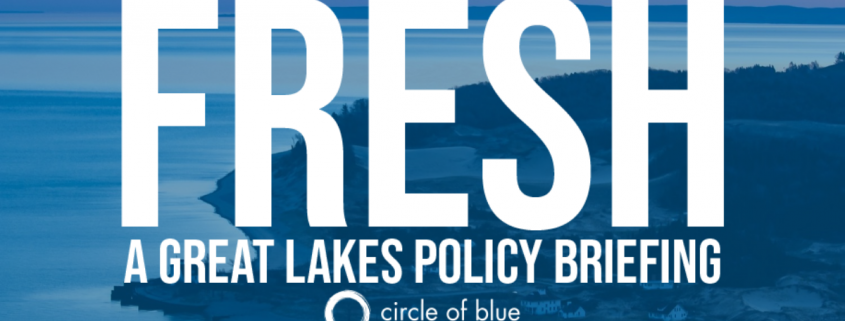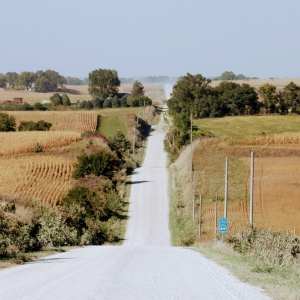Fresh, March 5, 2024: After a Snowless Winter, Minnesota Growers Prepare Healthy Soils for Flash Floods and Wildfire
March 5, 2024
Fresh is a biweekly newsletter from Circle of Blue that unpacks the biggest international, state, and local policy news stories facing the Great Lakes region today. Sign up for Fresh: A Great Lakes Policy Briefing, straight to your inbox, every other Tuesday.
— Christian Thorsberg, Interim Fresh Editor
This Week’s Watersheds
- After one of the warmest winters on record, Minnesota farmers are readying for a “new normal” of unexpected rains, wildfire, and a lack of frost.
- In Michigan, $1.7 million will fund six Great Lakes studies, on lake trout, invasive carp, “blue gentrification,” and more.
- A proposal to barge garbage down the Chicago River has been canceled after three years of planning.
- Communities in northern Wisconsin are angry after the state Legislature approved a $1.1 million boat launch project, but denied a similar second program.
Support has recently flipped against a gas-fired power plant proposed for the Nemadji River near Lake Superior in northern Wisconsin.
“One of our biggest fears is new work on this gas plant they want to build will raise the level of the river even higher.” – Bob Miller, a descendant of an Ojibwe chief.
After seven years of lobbying and preparation, support for a $700 million gas-fired power plant proposed for Superior, Wisconsin, is now waning. Leaders in northern Wisconsin are reconsidering earlier stances, citing both environmental and cultural damage as reasons to stop the plant’s construction, planned to begin this spring, The Star Tribune reports.
The Nemadji Trail Energy Center is set to be built on the Nemadji River, which flows into Lake Superior just a few miles away. Despite environmental assessments, many in the community remain concerned about new fossil fuel-powered infrastructure, and its potential to harm local waterways and estuaries. Controversially, the plant would be built adjacent to an Anishinaabe cemetery, where 200 people are buried — and to which, more than 100 years ago, they were already relocated, after the unfinished construction of ore docks forced the cemetery’s movement. “The trauma of moving these graves for an industrial project, only to have a new industrial project built pretty much on top of them is just really offensive,” said Superior Mayor Jim Paine.
Fresh from the Great Lakes News Collaborative
- More than 31,000 pounds of trash removed from Michigan rivers, streams, and creeks — Michigan Public
- “Bad River” documentary combines historical treatment of indigenous people with the fight to protect Lake Superior — Great Lakes Now
- Climate change is erasing Michigan winters, taking our heritage with them — Bridge Michigan
The Great Lakes News Collaborative includes Bridge Michigan; Circle of Blue; Great Lakes Now at Detroit Public Television; and Michigan Radio, Michigan’s NPR News Leader. We work together to produce news and information about the impact of climate change, pollution, and aging infrastructure on the Great Lakes and drinking water. This independent journalism is supported by the Charles Stewart Mott Foundation. Find all the work here.
Climate Oddities Put Minnesota’s Growers in New Position
Minnesota’s warmest winter on record was also one of the state’s least snowy.
The lack of snow, a seasonal oddity brought on by climate change and El Niño, will have trickle down effects for farmers this growing season, Minnesota Public Radio reports. With relatively unfrozen ground, spring rains will thaw and “recharge” a healthy soil profile. Meanwhile, a lack of frost is likely to lessen the chance of destructive spring floods, which are usually brought on by sudden thawing.
But pests were likely to have survived the mild winter, too, and may arrive earlier in the season than usual. As the summer progresses, sudden rain events — which have been occurring more frequently in Minnesota — are likely again, underscoring the importance of efficient drainage infrastructure.
Meanwhile, if this week’s Texas panhandle fires are any indication, growers may also need to prepare for the drifting of wildfire smoke onto their land, and a relentless summer of “zombie fire” impacts from Canada.
In the News
Boat Grant Controversy: The Wisconsin Legislature approved $1.1 million in grants to refurbish boat docks and ramps at Iron County’s Saxton Harbor — but rejected $1.02 million for a similar project next door, in the harbor town of Ashland, Wisconsin Public Radio reports. Lawmakers argued that Ashland couldn’t contribute enough funding of its own, compared to Iron County. But critics say that as a smaller, poorer town, Ashland couldn’t be expected to match the larger town’s funding. Ashland’s grant, WPR reports, would have been used to cover additional expenses incurred for cleaning its boat launch, built on a former Superfund site.
Sanitary and Ship Canal: Commercial garbage hauler LRS has canceled its “sustainable barging” proposal, which would have shipped “hundreds of truckloads” of Chicago’s trash downstate, WBEZ reports. The company says the plan would have saved millions of pounds of carbon dioxide and diesel emissions, compared to the trucks which currently move garbage from the city. But residents in the adjacent Little Village neighborhood had raised concerns that the barges would “stir up toxic materials” in the Sanitary and Ship Canal, thus hurting water quality. The company scrapped its plan after the EPA said it would investigate the waterway’s contamination.
Looking Ahead
Michigan Sea Grants: Six research grants totaling $1.7 million have been issued by Michigan Sea Grant, a partnership between the University of Michigan, Michigan State University, and NOAA, WOOD-TV reports. Proactive conservation and climate preparedness are among the major themes for the researchers, who represent universities and research centers throughout the state. Invasive carp, lake trout, algal blooms, and winter limnology comprise four of the six studies. Another will investigate how management of the Great Lakes can contribute to the United States’ “30 x 30” conservation goal, while the sixth will investigate “blue gentrification” — the effects of waterfront development and vacation rentals on local communities.
Upcoming Events
March 8 — Michigan Chapter of the Soil & Water Conservation Society ANR Seminar — learn more
March 12 — 2024 Western Dredging Association – Midwest Chapter Meeting — learn more
Other News
Ohio Mine Cleanup: The Biden administration has announced $46.4 million to begin the cleanup of the state’s thousands of abandoned mines and their environmental impacts — including polluting fresh water with runoff — Ideastream Public Media reports.
Indiana Wetlands: A bill that would allow Indiana’s Department of Natural Resources to designate certain wetlands as wildlands — a classification which would offer homeowners tax breaks if they conserve them — is awaiting Gov. Eric Holcomb’s signature, Indiana Public Radio reports.
Christian Thorsberg is an environmental writer from Chicago. He is passionate about climate and cultural phenomena that often appear slow or invisible, and he examines these themes in his journalism, poetry, and fiction.









Leave a Reply
Want to join the discussion?Feel free to contribute!